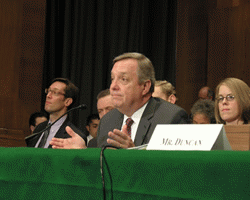
Sen. Durbin testifying
(Image by Senate Committee on Health, Education, Labor and Pensions) Details DMCA
According to Senator Durbin's website, the amendment "gives small businesses and their customers a real chance in the fight against the outrageously high "swipe fees'...It will prevent the giant credit card companies from using anti-competitive practices." Yet due to Visa's exploitation of the legislation's weaknesses, the amendment fails to fix anti-competitive pricing and to lower prices for consumers and businesses.
Lower costs for retailers and prices for consumers
The Durbin Amendment hopes to rectify the clearest manifestation of what its supporters consider anti-competitive pricing: higher costs for retailers, which translate into higher prices. By directly capping debit fees, Durbin hoped that merchants would immediately see lower expenses and pass some of those savings along to their customers. For small retailers, this will most certainly not be the case.
"These rules will give small businesses some relief from the unreasonably high fees that the Visa and MasterCard duopoly fix," Durbin promised in an October 1st press conference.
But as CEO Mark Horwedel of Merchant Advisory Group said in a Wall Street Journal article, small merchants are "shocked that, in their case, their costs are actually going to increase."
Visa and its competitor MasterCard, who between them account for 80% of the debit processing market, have committed to charging some retailers the maximum allowed swipe fee for small-ticket debit transactions.
Before the Durbin Amendment, a one-store coffeeshop might pay a 7-cent fee on a $2 cup of coffee and a 35-cent fee on a $20 group order. Durbin hoped to cap the latter fee at 23 cents, and leave the first unaffected: a ceiling, not a guideline.
Instead, that $2 coffee may now come with a 22-cent interchange fee, an increase of over 200%, which will result in higher prices for consumers. Visa and MasterCard's actions ensure that, far from paying lower interchange fees, small merchants will actually face much higher costs than before.
Fixing monopoly pricing
The second prong of the Durbin Amendment addresses what legislators see as anti-competitive pricing. Now, debit cards cannot be restricted to one network, and merchants cannot be banned from processing the cards on other networks. The intent is to introduce competition to a market previously dominated by Visa and MasterCard, thereby bringing prices down to a viable level.
But a new Visa fee, which has gone largely unnoticed, will hinder merchants' ability to process cards on other networks and will leave them vulnerable to long-term price increases. Visa announced in its third quarter earnings call that it would introduce a network participation fee (NPF): a flat charge levied on retailers who accept any Visa cards, be they credit, debit or prepaid debit cards. In exchange, merchants will pay a lower variable interchange rate.
Merchants have little recourse if they want to avoid the NPF. According to Visa CEO Joseph Saunders, "they can opt out if they don't want to accept Visa cards." But to do so, retailers would have to deny any card carried on the most popular network at the point of sale. Merchants see a per-transaction fee decrease if they process on Visa, so they will have little incentive to process on another network after they pay the NPF. This advantage in variable costs deters Visa's competition.
Most importantly, while interchange fees are regulated, the new NPF is not. "Does [the NPF] constrain our ability to price? I don't think that we have done anything that constrains our ability to take actions in the future that we deem to be appropriate," said Saunders on an earnings call, "and I think the key word here is deem to be appropriate."
Stifel Nicolaus analyst Chris Brendler argues that "the NPF, once established, should actually increase Visa's long-run pricing power since merchants will have little ability to deter future price increases" [and] there are few governors on future price increases."
Many Wall Street analysts believe that Visa will raise the NPF in the future, capitalizing on both higher revenues per merchant and the merchant's inability to switch to another processor.
Analysts believe that by tying retailers to their network, Visa will maintain or even increase its market share.
"Clearly, [Visa] chose not to take Durbin lying down. Tapping the entire Visa customer base to subsidize aggressive PIN-debit pricing should significantly boost [their] market share, possibly above today's exclusivity-driven levels. This aggressive approach is clearly bad news for competing PIN-debit networks," concludes Brendler.
The Durbin Amendment was intended to lower prices for retailers, particularly small merchants, and to introduce competition into a previously stratified market. However, both Visa and MasterCard immediately raised fees on small retailers, treating the amendment's ceiling as a floor. In years to follow, unregulated fees like the NPF stand to discourage merchants from using other network processors. For all the controversy over the Durbin Amendment, it fails in the long run to accomplish its goals.




